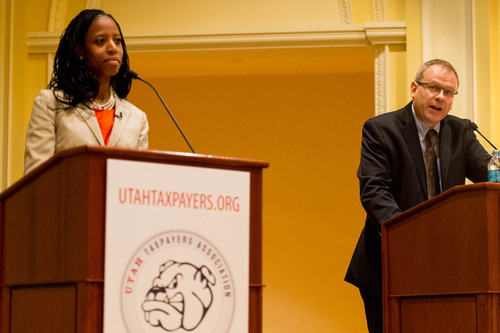This is an archived article that was published on sltrib.com in 2014, and information in the article may be outdated. It is provided only for personal research purposes and may not be reprinted.
The new Utah Debate Commission said a third-party candidate had to reach 10 percent in its poll to earn a spot in one of its televised debates. None made the cut.
And a few Democrats came surprisingly close to missing out as well.
The commission released the survey conducted by Lighthouse Research on Monday, and it is devastating to every political party in the state except for Republicans. The state's dominant party has massive advantages in each of the four congressional campaigns as well as the contest for Utah attorney general.
The closest race is in the 4th Congressional District, where Republican Mia Love had twice as much support as her Democratic opponent Doug Owens, 46 percent to 23 percent, with 23 percent undecided.
The commission stressed this poll has little analytical value in comparing the top competitors, even if it was used to eliminate more marginal candidates from participating in its debates. The poll was conducted in late August and early September, said Nena Slighting, the executive director of the Utah Debate Commission. Since the poll had a margin of error of nearly 4 percentage points, the commission would accept a third party candidate that reached 6 percentage points, but no one reached that threshold.
A few Democratic candidates, such as Donna McAleer in the 1st District and Charles Stormont running for Attorney General, only obtained 13 percent
"It is very early on and a lot can happen between now and then," Slighting said, arguing the poll was meant to identify who would be a viable candidate, not who would win the contest.
"These poll numbers should not be misinterpreted as predictions of the outcomes of the races," said commission co-chairman Bob Bennett, a former U.S. senator. "They are simply measures of name recognition at this time."
Owens' Campaign Manager Casey Frary said the poll had "skewed methodology" since it involved 400 registered voters in each race and not likely voters and doesn't try to ferret out the position of undecided voters. She said it shouldn't carry the same weight as more detailed polls commissioned by Utah Policy that found Love with a 12 percentage point advantage, or Owens' own poll that had him down 9 points.
Even if that's true, this poll shows a trend, said Dave Hansen, Love's campaign manager.
"I was surprised by the margin in the race, to be honest with you, but very pleased with it," he said.
However much credence the commission's poll is given, it's another data point showing how challenging it will be for any member of the minority party to pull off an upset this November.
"We in the Democratic Party know it is always a tough row to hoe in Utah, but we are still chipping away and we think these races will tighten up before Election Day," said Utah Democratic Party Chairman Peter Corroon.
He noted that Love has started her TV ad campaign, while Owens will launch his next week.
Once on the air, he expects Owens to close the gap on Love, who ran and lost against Rep. Jim Matheson, D-Utah, in 2012.
James Evans, the chairman of the Utah Republican Party, sees the results as more of an indication of the national mood, than a reflection of how many voters have heard of Reps. Rob Bishop, Jason Chaffetz or Chris Stewart.
"We have seen for six years now what Democrats are offering and I think collectively voters just want to go in a different direction," he said. "I think this election will be a referendum on President Barack Obama and his policies."
The Utah Debate Commission has 28 members including representatives of the major media, such as Salt Lake Tribune Editor Terry Orme. It also contains civic leaders and past candidates for office from the major parties.
The series of debates will be televised live starting Sept. 23 with the 1st Congressional District showdown between Bishop and McAleer at Weber State University. A full rundown of the debates can be found at utahdebatecommission.org.
Utah Debate Commission poll results*
Here are the candidates who will participate in the televised debates and how well they fared in a poll conducted in late August and early September.
• 1st Congressional District
Rep. Rob Bishop, R — 57.4 percent
Donna McAleer, D — 13.2 percent
undecided — 21.6 percent
Debate: Tuesday, Sept. 23 at 6 p.m.
Weber State University
Ballroom B, Shepherd Union Building
• 2nd Congressional District
Rep. Chris Stewart, R — 47.8 percent
State Sen. Luz Robles, D — 18.6 percent
undecided — 25.2 percent
Debate: Thursday, Sept. 25 at 6 p.m.
Southern Utah University
Sterling R. Church Auditorium, Sharwan Smith Student Center
• 3rd Congressional District
Rep. Jason Chaffetz, R — 58.8 percent
Brian Wonnacott, D — 12 percent
undecided — 23.9 percent
Debate: Tuesday, Oct. 7 at 6 p.m.
Utah Valley University
Library Lecture Hall
• 4th Congressional District
Mia Love, R — 46.4 percent
Doug Owens, D — 23.1 percent
undecided — 23.1 percent
Debate: Tuesday, Oct. 14 at 6 p.m.
University of Utah
KUED Studios
• Utah Attorney General
Attorney General Sean Reyes, R — 40.9 percent
Charles Stormont, D — 12.6 percent
undecided — 31.7 percent
Debate: Wednesday, Oct. 1 at 6 p.m.
Brigham Young University
KBYU Studios
* Totals do not add up to 100 percent because every third party candidate was listed in the poll and those percentages are not included here.



